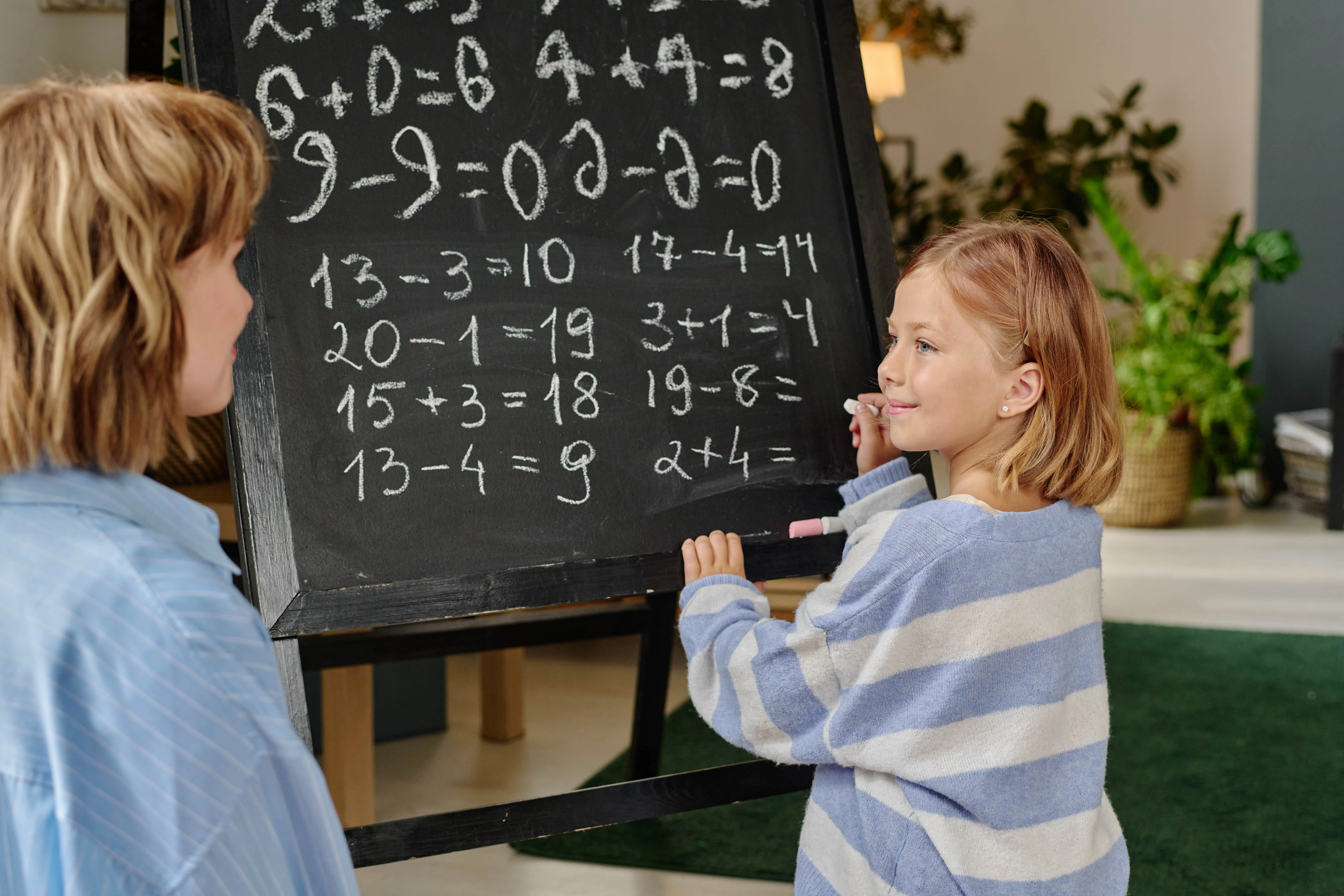10 Everyday Ways to Strengthen Early Math Skills at Home

Everyday Strategies To Boost Early Math Skills
The best way to nurture early numeracy skills at home is to let them grow alongside daily life. No drills required. Think about all the chances to count, sort, measure, and solve little problems together.
Count Everything
Numbers are everywhere! There are endless things to count, from the stairs to fruit slices to toy cars. You can make it more exciting by turning counting activities into a challenge:
- How fast can you count all the buttons on your shirt?
- Can you count the steps as we climb?
- How many slices of fruit are on your plate?
These small moments build basic math skills without feeling like a lesson.
Cook up Some Math
Your kitchen can double as a math classroom. Measuring ingredients introduces fractions, volume, and capacity. Meanwhile, stirring, pouring, and even estimating how much flour fits into a cup help children grasp measurement concepts.
Try explaining each step. For example, you could say, “Two half cups make a whole. Let’s add them together.” In this way, cooking becomes a fun, hands-on guide to developing early childhood math skills.
Play Store at Home
Kids love pretend play, which makes a homemade “store” an easy win. Grab some coins or play money, line up a few toys or snacks, and let them shop. As they buy and sell, they’ll practice adding, subtracting, and making change.
Keep it lively with little challenges: “This apple costs three coins. If you pay with five, what do I give back?” It’s simple role-play, but it strengthens their number sense and makes math part of everyday fun.
Pattern Spotting
Patterns are everywhere once you start looking. Ask your child to find them in tiles, clothing, or leaves outside. Then, encourage them to extend patterns using beads or blocks.
Recognizing and creating patterns strengthens sequencing and prediction, which are essential in honing early number fluency.
Board Games and Card Games
Games like Snakes and Ladders, Dominoes, or Uno teach children to recognize numbers and strategize. Rolling dice and moving pieces provide practice with counting and probability. Even family card games help children sharpen math skills while laughing and bonding.
Story Problems in Daily Life
Real-life story problems show children that math matters. Even better, you don’t have to think hard to come up with examples:
- “You have three cookies and eat 1 — how many are left?”
- “We need six plates. We already have four on the table. How many more do we need?”
These little scenarios turn abstract math into something meaningful. If you’d like more examples or inspiration, here’s a helpful guide on math help for first graders.
Calendar Math
Calendars are handy tools for helping children understand sequencing and time. If your child is excited about a birthday, countdown the days together. Mark special events or talk about how many days are in a month. These daily habits deepen early math skills in a natural, visual way.
Sorting and Classifying
Gathering the toys or even getting your child to help sort the groceries can become early math activities. Ask your child to group their toys by size or sort fruits by color. It also helps to talk through reasoning and ask them to explain why certain items go together. With these activities, you can help hone their ability to spot patterns and organize.
Measure Everything
Bring out your rulers, tape measures, or cups, and let your child compare sizes and capacities. You can ask them to measure the length of their favorite book or guess which jar holds more water. These activities are often found in any practical guide to developing early childhood math skills because they help kids explore measurement and estimation in hands-on ways.
Math Through Music and Rhymes
Looking to make math memorable? Counting songs or nursery rhymes with numbers helps children internalize rhythm and sequencing.
Music is not just enjoyable; it’s also effective in strengthening basic math skills while building language and memory.
How Video Games Can Help
Math doesn’t need to end with daily routines around the house. Digital tools and educational video games can extend the learning and make it feel fun and fresh.
Prodigy Math is a great example. It’s a game-based learning platform that turns problem-solving into an adventure that keeps kids motivated. Through extra practice that feels like play instead of homework, kids can hone their early numeracy skills while seeing math as enjoyable.
FAQs
At what age should I start teaching math at home?
Even toddlers can begin with simple counting and sorting. Early math skills develop gradually through playful interaction.
My child dislikes math. How can I make it fun?
Use games, stories, real-life examples, and hands-on activities. The goal is to focus more on understanding than memorization.
How much time should I spend on math at home?
Just a few minutes daily is more effective than long, infrequent sessions.
Can technology help with early math learning?
Yes! Interactive programs like Prodigy Math personalize the experience and make math feel like a game.
How do I know if my child is progressing?
Look for better number recognition, problem-solving, and enthusiasm for math activities. Growth often shows in small but steady steps.
Make Math Part of Everyday Fun
Your day is already full of chances to sneak in math. Whether counting blocks or singing number songs, consistent practice can help children strengthen their problem-solving and reasoning skills. Pairing these activities with fun, adaptive tools like Prodigy Math makes learning engaging and effective.
Kids don’t just answer questions on a screen with Prodigy Math. Instead, they explore a fantasy world where each math problem becomes part of the adventure, motivating them to keep playing and learning. It’s a great way to make math practice feel like something they choose, not something they have to do.
Create your free account today and combine everyday play with interactive math adventures!











